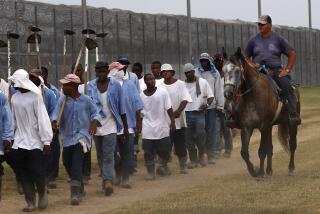Serfs Cast Off Chains in Pakistan
- Share via
DUMBALO, Pakistan — After centuries of living like slaves, the serfs of southern Pakistan are finally rising up.
Thousands of people locked by debt and chains to the country’s biggest landlords are setting themselves free and demanding better lives. Laborers who for generations have been swapped and sold like animals are fleeing plantations, marching in the streets and attacking their owners with rocks and sticks. They are challenging one of the world’s largest remaining bastions of feudal serfdom, where the richest landlords include some of the country’s most powerful politicians.
“I was chained to a rock, so I picked it up and put it on my shoulder and ran away,” said Chetan Bheel, a laborer who escaped from a plantation near here. “I had to get out of that place.”
The revolt of the serfs has sparked a backlash by the landlords, who are moving to crush the rebellion before it gets out of hand. After about 7,500 bonded laborers fled their farms or were freed by authorities, enforcement of a law abolishing bonded labor has all but ceased--allegedly under pressure from the big landlords.
Armed men are entering colonies of freed serfs and dragging runaways back to the plantations. Bonded laborers suspected of contemplating escape are being chained, raped, tortured and killed.
“I bought that man. I paid the money, and I have a proper receipt,” plantation owner Ayaz Virk said of Bheel, the laborer who ran away. “I could have sold him to someone else.”
The clash between the serfs--estimated to number as many as 50,000--and the landlords is reverberating throughout this impoverished country, where politics and economics have long been dominated by a handful of land barons. Some economists and human rights workers say the conflict could prove to be a turning point in Pakistan’s evolution toward a more modern society.
Now that the bonded laborers have seen the first signs of liberty, they say, the landlords will not be able to hold them down.
“The landlords cannot win,” said Akmal Hussain, a Pakistani economist and social worker. “The peasants are ready for change, and nothing that the landlords can do will stop them.”
Experts estimate that as many as 20 million people worldwide toil under some kind of debt bondage. Many of the largest pockets are in South Asia, where the old relationships between landlord and serf live on.
In Pakistan, the revolt against serfdom is unfolding in the southern half of Sindh, an arid province whose agricultural bounties flow from the canals that snake to the Indus River. Fields of wheat stretch for miles and miles, dotted by the grass shacks and mud huts that house the laborers who work the land.
Historically, farming in Sindh has been sustained by sharecropping, an antiquated system in which laborers receive little or no wages but split the harvest with the landlord. Most of the laborers are Hindus--a minority in Pakistan--whose names reflect their lowly social caste: Bheel, Kholi and Mallah. They live on the land but don’t own it.
According to lawyers and human rights workers, the landlords of Sindh have long exploited their workers by lending them money and holding them prisoner until the loans are repaid. High interest rates ensure that the peasants rarely pay off their debts. Peasants move from one plantation to the next as their loans are sold from one landlord to another.
Ali Nawaz Machi came to work as a laborer on Virk’s farm six months ago. He lives with seven family members in a grass hut that he shares with water buffalo and goats.
Machi, 25, says he borrowed $1,500 from his landlord--most of which he used to pay off his previous landlord. He said he has picked and planted since he was a boy and can’t remember the first time a landlord lent him money. Machi makes about 65 cents a day plus a share of the crops, and he knows that it might be a long time before he can repay his debt.
“They would not allow us to leave here,” Machi said, eyeing the farm’s foreman a few yards away. “We are poor people. What can we do?”
Some of Sindh’s landlords--known as zamindars--employ more extreme methods to ensure that their debt-ridden workers don’t slip away: They lock them up.
Under the prodding of human rights workers, police in 1995 raided a plantation in southern Sindh and freed 67 laborers who were tied up and chained together. Of the estimated 7,500 bonded laborers who have escaped or been released since then, human rights workers say, they have found “several hundred” tied up or in chains.
“Here, the landlords are the kings,” said Aftab Ahmed of the Human Rights Commission of Pakistan, an independent group that helps bonded workers.
Raju Bheel, 25, said he and his family were chained night and day for years while working on a plantation until police liberated them six months ago. He had run up a debt of $600 and says his master thought he might run away.
“We were never paid anything,” Bheel said of the seven years he spent on the plantation. “Only flour and chilies.”
Today, Bheel lives in a colony of runaway serfs. He has the leathery palms of a laborer and the crazy eyes of a man on the run.
“We are always afraid of being recaptured,” he said.
The man who owns the farm where Bheel worked is Arbab Ghulam Rahim, a member of Pakistan’s National Assembly. Rahim acknowledged that Bheel once worked for him but dismissed his claims of mistreatment.
“It’s a big lie,” Rahim said in an interview at his parliamentary residence in Islamabad, the capital. “There is a conspiracy against the agricultural class.”
Across southern Sindh, zamindars described a benign system that obliges them to act like parents to their laborers through good harvests and bad. The landlords say they pay for weddings, they pay for medicine, and they bail their laborers out of jail. The zamindars say they have no choice but to lend money to their workers, who otherwise would refuse to work.
“They are blackmailing us,” Rahim said. “They demand money, and then they leave.”
Although the government formally abolished the use of bonded labor in 1992--and most farmers no longer rely on it--economists say the practice survives in part because large landholders still dominate Pakistan’s political system. Agricultural land in Pakistan remains concentrated in a small number of families: According to one study, close to 40% of the arable land in Pakistan is owned by fewer than 1% of its landowners. One of the wealthiest land-holding families is that of Benazir Bhutto, the former prime minister.
As a result, Pakistan has a largely agricultural economy with a nearly medieval social structure. Fewer than half its people are able to read and write. Pakistani newspapers and education groups have documented at least 5,000 “ghost schools”--many of them in rural areas--where no students study because landlords often pay the teachers to stay at home.
“There is an active, sustained interest on the part of the feudal landlords to keep their laborers from getting educated,” said Syed Rifaat Hussain, a professor of politics at Quad-i-Azam University in Islamabad.
The revolt against the zamindars in southern Sindh began in the early 1990s, when the Pakistani National Assembly formally abolished bonded labor and imposed rules on sharecropping. Although no zamindars were arrested, thousands of serfs were set free. Local politicians took up the cause.
Then the zamindars struck back. In March, local newspapers reported that a high-ranking public administrator had ordered police to stop raiding local plantations. The article said the administrator, Gul Mohammed Umrani, issued the orders “under pressure from the feudal lobby.”
Umrani did not respond to numerous requests for an interview. A high-ranking police official from the region brushed off complaints against the big landowners.
“I don’t think bonded labor is a major problem here,” said Mohammed Yamin Khan, the deputy inspector general of police.
Since March, lawyers and human rights workers say, the police have ignored hundreds of complaints about bonded labor. One lawsuit filed on behalf of a group of serfs is pending against Ali Mardan Shah, a former chief minister of Sindh. The lawsuit alleges that Shah killed a woman on his farm during a dispute with his laborers.
“This is the backlash,” said Ali Ahmed Taqvi, a lawyer working on behalf of bonded laborers. “Our people are afraid of the zamindars.”
The reaction by the zamindars has coincided with a rash of kidnappings of former bonded laborers. Groups of armed men are raiding colonies of freed serfs and taking them back to the farms they had fled. In September, men with trucks drove into an escapees’ colony and kidnapped 107 runaways. Police secured the return of 106 of them, but the zamindar, Ghulam Qadir Marri, was not charged.
“Marri kept one laborer as a token of his power,” said Ahmed, the human rights worker.
In July, a group of men dressed in police uniforms swooped into Nawabad--a village of freed laborers--and dragged two men away. The uniformed men said that the laborers had not paid their debts to a local landlord named Habib and that they were taking them back until they did.
“They would have caught more of us, but we hid in the cane fields,” Rehka, one of the villagers, said in Hyderabad, the provincial capital of Sindh.
The villagers had gathered in Hyderabad to demand the return of their brethren. The women in the group said they had escaped from Habib’s farm in part because they were often sexually assaulted by the foremen.
“They raped me not for sex but to disgrace me,” a young woman said.
In some villages, the landlords are having a tougher time reclaiming their runaways. When a group of men tried to kidnap a boy from an escapee colony called Kotli last month, hundreds of villagers rose to attack them.
“We had only sticks, and they had guns,” said Bachi, a woman who says her four children are still tied up on a nearby farm. “But we chased them away.”
Kotli is one of the colonies of freed serfs that have sprung up across southern Sindh. Huts of woven weed house about 700 people, many of whom leave during the day to work on the farms of landlords known for their kindness. When a visitor is welcomed to Kotli, each of the villagers lines up for a handshake.
On the Virk plantation, a laborer named Baghali laid bricks for the landlord’s new house. He and his family owe the landlord $1,000 and cannot leave until they repay him. His wage is 65 cents a day plus a share of the crops, but Baghali believes that he will soon be able to pay his debts.
“I am hoping for a good harvest,” Baghali said during a break from his bricklaying. “After all, if a man does not pay his debts, he loses credibility.”
More to Read
Sign up for Essential California
The most important California stories and recommendations in your inbox every morning.
You may occasionally receive promotional content from the Los Angeles Times.













